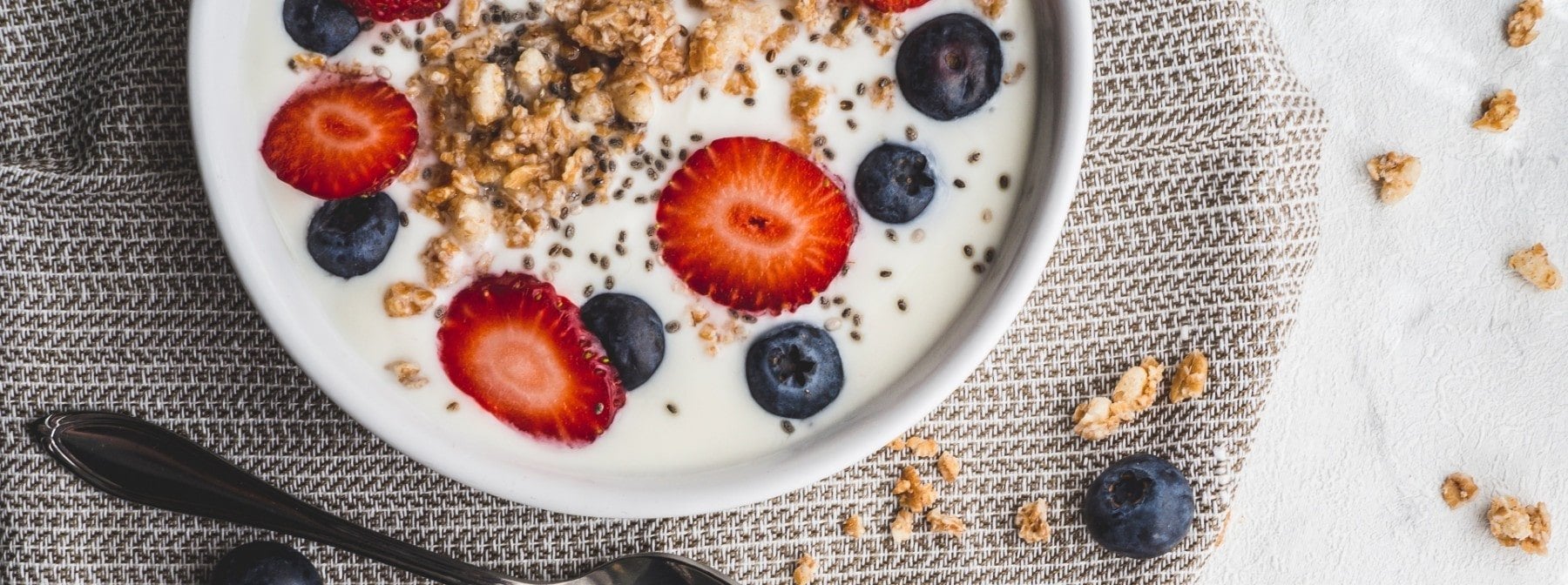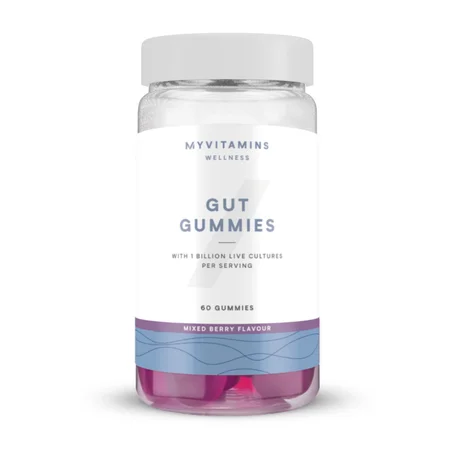- Jäger, R., Mohr, A.E., Carpenter, K.C. et al. International Society of Sports Nutrition Position Stand: Probiotics. J Int Soc Sports Nutr 16, 62 (2019). https://doi.org/10.1186/s12970-019-0329-0
- Adolfsson, O., Meydani, S. and Russell, R., 2004. Yogurt and gut function. The American Journal of Clinical Nutrition, 80(2), pp.245-256.
- Dimidi E, Cox SR, Rossi M, Whelan K. Fermented Foods: Definitions and Characteristics, Impact on the Gut Microbiota and Effects on Gastrointestinal Health and Disease. Nutrients. 2019;11(8):1806. Published 2019 Aug 5. doi:10.3390/nu11081806
- Bourrie BC, Willing BP, Cotter PD. The Microbiota and Health Promoting Characteristics of the Fermented Beverage Kefir. Front Microbiol. 2016;7:647. Published 2016 May 4. doi:10.3389/fmicb.2016.00647
- Park KY, Jeong JK, Lee YE, Daily JW 3rd. Health benefits of kimchi (Korean fermented vegetables) as a probiotic food. J Med Food. 2014 Jan;17(1):6-20. doi: 10.1089/jmf.2013.3083. PMID: 24456350.
- Kuligowski M, Jasińska-Kuligowska I, Nowak J. Evaluation of bean and soy tempeh influence on intestinal bacteria and estimation of antibacterial properties of bean tempeh. Pol J Microbiol. 2013;62(2):189-94. PMID: 24053022.
- Raak C, Ostermann T, Boehm K, Molsberger F. Regular consumption of sauerkraut and its effect on human health: a bibliometric analysis. Glob Adv Health Med. 2014;3(6):12-18. doi:10.7453/gahmj.2014.038
7 nejlepších probiotických potravin

Probiotika jsou živé organismy ve střevech, která udržují zdravá. V posledních letech bylo zdraví střev spojováno s několika důležitými potenciálními zdravotními benefity, jako je lepší imunita, zdraví srdce a nálada. 1
Pokud chcete vylepšit bakteriální profil vašich střev, existují různé doplňky stravy, které můžete užívat. Ty obvykle obsahují spektrum různých druhů probiotik. Existuje však i řada potravin, které obsahují probiotika, a jejichž zařazení pomůže udržet vaše střeva zdravá.
Přejděte rovnou na:

Jaká probiotika existují?
Probiotika jsou zdravé bakterie. Ačkoliv bakteriím se obvykle spíše vyhýbáme, probiotika jsou ty dobré bakterie, které pomáhají zachovat zdraví střev.
Existují různé druhy těchto bakterií, nejběžnější jsou:
- Bifidobakterium
- Laktobacillus
- Saccharomyces boulardii, což je typ kvasnice
Potraviny, které obsahují probiotika, jsou ty, které prošly procesem fermentace. Spousta probiotik je zničena během zpracování potravin, takže většinu potravin bohatých na probiotika najdete v lednici.
Probiotické potraviny
1. Jogurt
Jogurt je dobrým zdrojem bílkovin a vápníku a je vyroben z fermentovaného mléka a obsahuje probiotika, která udržují rovnováhu ve střevech.
Hlavní druh probiotik v jogurtu jsou bakterie jako Streptococcus a Lactobacillus. 2 Konzumace těchto probiotik je spojována se zlepšením intolerance laktózy a zácpy. 2
2. Kombucha
Kombucha je fermentovaný čaj, o kterém jsou zmínky už od roku 220 před naším letopočtem ze severovýchodní Číny. 3 Tradičně se vyrábí fermentací černého čaje, ale je možné použít i zelený čaj. Nejhlavnějším typem bakterií v kumbuše je Komagataeibacter, Lyngbya, Gluconobacter, Lactobacilli a Bifidobacteria. Také obsahue Candidu a Zygosaccharomyces kvasnice. 3
Ačkoliv existuje několik studií na zvířatech, které podporují pozitivní efekty kombuchy, v současné době není dostatek důkazů ohledně dopadu kombuchy na zdraví lidských střev. 3
3. Kefír
Kefír je fermentovaný nápoj z kravského nebo kozího mléka. Je spojován s řadou zdravotních benefitů včetně gastrointestinální imunity, hojení ran a redukce cholesterolu. 4
Nejběžnějšími typy bakterií v kefíru jsou Lactobacillus, Lactococcus, Streptococcus a Leuconostoc. Kefír také obsahuje velké množství mikrooorganismů z řady kvasnic, jako jsou Saccharomyces, Kluyveromyces a Candida.
4. Kimči
Kimči je tradiční korejský pokrm vyráběný z fermentované zeleniny jako je kapusta a ředkve. Má podobné benefity jako jogurt a ostatní mléčné probiotické výrobky.
Kimči se vyrábí především z košťálové zeleniny a dalších funkčních potravin jako je česnek nebo zázvor a určitě se dá považovat za zdravou součást jídelníčku. Kimči je spojováno s několika různými zdravotními benefity včetně zlepšené imunity a zdraví pokožky. 5
5. Miso
Miso je tradiční japonská pasta vyrovená z fermentovaných sójových bobů. Miso se běžně používá do polévek a mezi připisované zdravotní benefity patří lepší imunita a trávení. 3
Miso také obsahuje Lactococcus a Bacillus probiotika. 3 Miso je také bohaté na minerály a různé vitamíny jako jsou vitamíny skupiny B, E, K a kyselina listová. 3
6. Tempeh
Japonská potravina tempeh je dalším probiotickým jídlem vyrobeným z fermentovaných sójových bobů. Díky bílkovinám ze sójových bobů je tempeh skvělou náhradou masa pro vegetariány a vegany a je také dobrým zdrojem zdravých mononenasycených a polynenasycených tuků.
Konzumace tempehu zvyšuje hladinu Bifidobacterium a Escherichia coli ve střevě. 6
7. Kysané zelí
Kysané zelí je plné vitamínů A, B, C a K.
Hlavními probiotiky v kysaném zelí jsou L. Mesenteroides, L. Plantarum a L. Brevis. 7 Kysané zelí také obsahuje velké množství histaminu, takže ti, co trpí alergiemi nebo sennou rýmou by si měli dávat pozor. 7
Co si z článku odnést
Probiotika jsou důležitá pro udržování zdravých střev, což má nespočet pozitivních účinků na celkové zdraví. Ačkoliv můžete probiotika užívat jakožto doplňky stravy, existuje celá řada probitických potravin, které můžete zařadit do svého jídelníčku. Určitě to stojí zato.

Liam on International Society of Sport Nutrition -sertifoitu urheiluravitsemusterapeutti ja hän on myös osa British Dietetics yhdistystä . Hänellä on liikuntatieteen kandidaatti sekä ISSN diplomi käytännön urheilu- ja liikuntaravitsemuksesta.
Liam on kokenut personal trainer ja hän auttaa asiakkaitaan saavuttamaan heidän terveyteen ja hyvinvointiin liittyviä tavoitteita käytännön ohjeilla, jotka perustuvat vankkaan tutkimustietoon.
Vapaa-ajallaan Liam on kisannut useassa eri painonnostokilpailussa ja hän harrastaa myös usein vaeltamista, jalkapalloa sekä kokkaamista. Lue lisää Liamista täältä.









